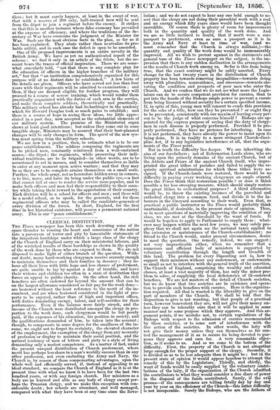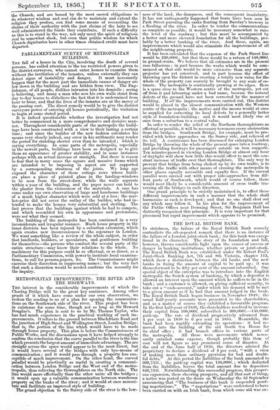CLERICAL DESTITUTION.
Tim Times newspaper has been this week devoting some of its spare thunder to rousing the heart and conscience of the nation into a paroxysm of terror and pity by lamentable statements of the iniquitous hardships under which a large class of the clergy of the Church of England carry on their ministerial labours, an of the wretched results of these hardships as shown in the quality of the work done by those who are exposed to them. We are not disposed to make light of either branch of the question. With- out doubt, many hard-working clergymen receive scarcely enough to maintain themselves and their families in decency ; they la- bour all their lives with little hope and less chance of preferment, are quite unable to lay by against a day of trouble, and leave their widows and children too often in a state of destitution that forces an appeal to public charity. On the other hand, the rich benefices are often endowed far beyond the amount that can be on the largest allowance considered as fair pay for the work done— are bestowed without the least reference to the merit of the in- cumbent, and are when bestowed considered in the light of pro- perty to be enjoyed, rather than of high and important offices, with duties demanding energy, talent, and self-sacrifice for their performance. Even if the balance were fairly struck, and the income of the Church were distributed amongst the clergy in pro- portion to the work done, each clergyman would be but poorly paid, if the expenses of his education, his position in society, and the qualifications demanded of him, be taken into the account ; though, to compensate in some degree for the smallness of the in- come, we ought not to forget its certainty, the elevated character of the employment, the exemption of the clergy from any necessity of profusion or display to maintain their social position, and the natural tendency of men of letters and piety to a style of living demanding only a modest competence. As a matter of fact, under the present unequal distribution of Church preferment, where merit has perhaps less share in a man's worldly success than in any other profession, not even excluding the Army and Navy, the Church is, by reason of these compensating advantages, upon the whole well and efficiently served, if, instead of appealing to an ideal standard, we compare the Church of England as it is at the present time with what we know it to have been for the last two hundred years, or with any foreign church. Her ministers as a body are as learned and able as any body of clergy except per- haps the Prussian clergy, and we make this exception with con- siderable doubt ; her schools are abundant, and well managed, compared with what they have been at any time since the Revo-
lution to ; and we do not expect hear any one bold enough to as-
sert that the clergy are not doing their parochial work with a zeal i and an energy which fifty years since would have been thought \ incredible. Of course there is plenty of room for improvement ) both in the quantity and quality of the work done. And. \ we are as little inclined to doubt, that if merit were a sure passport to preferment, even as sure a passport as it is in the Army and Navy at least in time of war (and we must remember that the Church is always iniiitant,)—the quantity and quality of the work done would be immeasurably improved. All we wish to protest against in the statements and general tone of the Times newspaper on -the subject, is the im- pression that there is any sudden declination in the arrangements or the results of Church work among us. So far is this from being true, that the exact contrary might be safely asserted. Every
change for the last twenty years in the distribution of Church property has been towards removing inequalities—towards doing away with pluralities, nonresidence, and sinecures—towards ele- vating the condition and. prospects of poor men who enter the Church. And we confess that we do not see what more the Legis- lature can do to Bemire competent provision for curates, than to put into the hands of the Bishops ample power to prevent a curate from being licensed without security for a certain specified income. If, in spite of this, young men will consent to evade this provision for the sake of a title, how can they be prevented ? or ought they to be prevented, consistently with our maxim of leaving every per- son to be the judge of what concerns himself ? Bishops are ap- pointed for the express purpose of seeing that the duty of clergy- men in each diocese is properly performed. Provided it be pro- perly performed, they have no pretence for interfering. In case it is not performed, they have already the power to insist upon its being done. It is in reality to a more stringent Church-disci- pline Aot, if to any legislative interference at all, that the argu- ments of the Times 'lint.
But in truth the , . ii ealty lies deeper. We are inheriting the sins of our forefathers ; not of Reformation Lords alone who are living upon the princely domains of the ancient Church, but of the Abbots and Priors of the ancient Church itself, who impro- priated the great tithes of parishes and failed to supply the re- (visite spiritual ministrations for which those tithes were as- signed. If the Church-lands were restored, there would be no difficulty in paying every working clergyman an ample stipend. Does the Times think that restoration possible ? or does it think possible a far less sweeping measure, which should simply restore the great tithes to ecclesiastical purposes ? A third alternative would be, to throw the existing incomes of the parochial and cathedral clergy into a common fund, and divide it to the la- bourers in the vineyard according to their work. Even that, so practical a public instructor as the Times would probably think unattainable, if desirable, in the present state of opinion. Thus, as in most questions of materially improving the condition of any class, we are met at the threshold by the want of funds. It would be hopeless to apply to Parliament to supply them : what- ever may happen within the next few years, we may safely pro- phesy that we shall net again see the national taxes applied to the extension or maintenance of the Church-establishment ; no friend to the Church would, under present circumstances, desire to moot the question. One remedy, indeed, we can suggest not very impracticable either, when we remember that a numerous and efficient body of ministers is supported by voluntary contribution through the length and breadth of this land. The problem for every Dksenting sect is, how to support their ministers without any endowment, or endowments so small as not to interfere with the general truth of the assertion. The Church of England, comprising the wealthy and educated classes, at least a vast majority of them, has only the minor pro- blem to solve of supplying the local deficiencies of ill-endowed
W benefices. e are not masters of the detail of Church societies, but we do know that two societies are in existence and opera- tion to provide such benefices with curates. Here is the organiza- tion required. All that is wanted is the liberality to give on the part of members of the Church. We shall be told that the disposition to give is not wanting, but that people of a practical turn, however benevolent they are, will not give their money un- less they can be tolerably sure that it will be applied in some manner and to some purpose which they approve. And this ar- gument points, if we mistake not, to certain regulations of the Bishops with respect to the admission of curates recommended by these societies, or to some sort of interference with the free action of the societies. In other words the laity will not give their money unless they can themselves so far con- trol the management of it as to secure its being devoted to pur- poses they approve and care for. A very reasonable objec- tion, as it seems to us. And so we come to the bottom of the
large enough for the proper support of the clergy. Secondly, it First, the property of the Church is not altogether large divided so AS to be less adequate than it might lie; but in the present state of opinion it would appear hopeless to attempt the remedy of this by the Legislature. Thirdly, and chiefly, the want of funds would be easily supplied by the voluntary contri- butions of the laity, if the organization of the Church admitted the contributors to what they would consider a due share of power in the disposal of the funds contributed. Surely, if the evil presses—if the consequences are telling fatally day by day and year by year on the efficiency of the Church—this latter difficulty is not insuperable. Surely the Bishops, who are the fathers of
the Church, and are bound by the most sacred obligations to do whatever wisdom and zeal can do to maintain and extend the religion they profess, can find some means of reconciling the claims of their authority with the just claims of the laity to see well administered the funds they contribute. If such a difficulty as this is to stand in the way, not only must the spirit of religious zeal be somewhat slack, but even that politic wisdom for which Church dignitaries have in other times obtained credit must have departed.



























 Previous page
Previous page